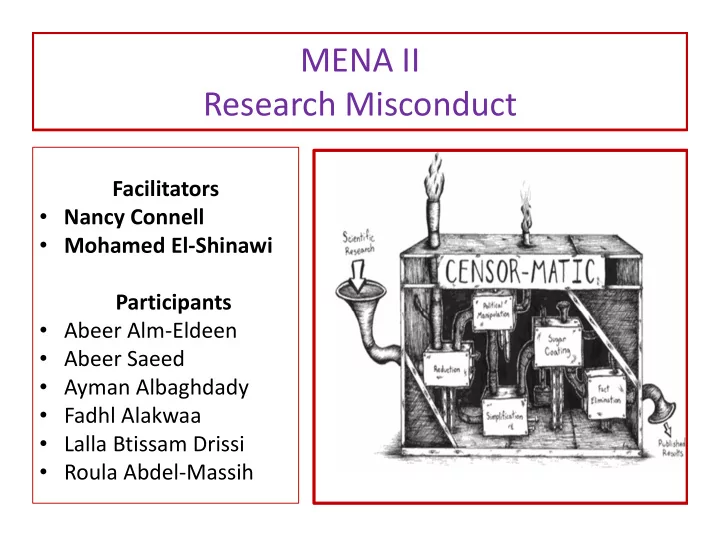

MENA II Research Misconduct Facilitators • Nancy Connell • Mohamed El ‐ Shinawi Participants • Abeer Alm ‐ Eldeen • Abeer Saeed • Ayman Albaghdady • Fadhl Alakwaa • Lalla Btissam Drissi • Roula Abdel ‐ Massih
Context • Target group: Postgraduate students – Prior to starting their research • Duration: 14 hours course: (2 hours/session) • Methodology: Lectures, group discussion, case ‐ studies, role ‐ play • Assessment: Pre ‐ test, post ‐ test, periodic and summative assessment.
Contents 1. Learning Goals 2. Learning Objectives 3. Pre ‐ test 4. Lecture 5. Post ‐ test 6. Homework 7. Periodic Assessment 8. Final Assessment
Learning Goal • Expose students to responsible conduct of research.
Learning Objectives 1. Define responsible conduct of research. 2. Identify the different forms of research misconduct. 3. Compare or analyze the differences between fabrication, falsification, and plagiarism. 4. Analyze case studies of fabrication, falsification, and plagiarism. 5. Develop methods to avoid misconduct behavior.
Pre ‐ test • In your opinion what are the measures that should be taken if a researcher commits minor falsification: A. The researcher should be prohibited from receiving grants for life B. Prohibited from receiving grants for 5 years C. Warn the researcher and give him another chance D. Termination of the work contract E. Jail time and monetary penalty
Lecture 5 Falsification
Responsible Conduct in Research • Research Misconduct is: fabrication, falsification, or plagiarism in: ‐ proposing, ‐ performing, or ‐ reviewing research, ‐ or in reporting research results.
Falsification • Is manipulating ‐ research materials, ‐ equipment, ‐ or processes, • or changing, • or omitting data or results • such that the research is not accurately represented in the research record.
Activity Role Play about Falsification
Examples
Examples Manipulation of research materials, equipment or process
Examples changing
Examples Omitting data or results
Examples http://undsci.berkeley.edu/article/socialsideofscience_06
Post ‐ test • In your opinion what are the measures that should be taken if a researcher commits minor falsification: A. The researcher should be prohibited from receiving grants for life B. Prohibited from receiving grants for 5 years C. Warn the researcher and give him another chance D. Termination of the work contract E. Jail time and monetary penalty
Homework!!! Why do researchers commit falsification? Who can detect falsifications? and How? To whom should falsification be reported? Who is/are accountable of the falsification? ‐ researcher ‐ supervisor / mentor ‐ jury of thesis arbitration ‐ committee of research center/site
Acknowledgement • Special thanks to: Nancy Connell and Mohamed El ‐ Shinawi. • We are very grateful to MENA II staff: Lida, Alastair, James, Clarissa, Jay, Elizabeth, Susan, M. El ‐ Fahham, Mona, M. Elhadidy, Huda, Samira, Yusra and all our colleagues. Special thanks to our movie director: Jay
Post ‐ Test • Why should we be concerned about data falsification? a. Influences research and clinical practice. b. Patients are put at risk by flawed research. c. Retracted work goes on being cited d. Waste of resources, human, and financial. e. Damages public trust in research/science.
"Tian ‐ Shing Lee, M.D., Joslin Diabetes Center, Harvard Medical • School. An investigation conducted by Harvard found that Dr. Lee, a former post ‐ doctoral fellow at the Joslin Diabetes Center, fabricated and falsified data in research on diabetes supported by the National Eye Institute. Primary data was missing for almost half of the figures and tables in a series of published papers and manuscripts prepared by Dr. Lee. https://explorable.com/scientific ‐ falsification In your opinion what are the measures that should be taken: • a. The researcher should be prohibited from receiving grants for life b. Prohibited from receiving grants for 5 years c. Warn the researcher and give him another chance d. Termination of the work contract e. Jail time and monetary penalty
Implications of Falsification • Legally • Ethically • Scientifically • Financially • Publications • Work licenses • Reputation
• What do you think the mentor had to do: a. Quit from the study. b. Falsify the data with the student. c. Discuss the subject with the supervisor. d. Advise the student to repeat the experiment again. e. Report to the high authority.
Recommend
More recommend